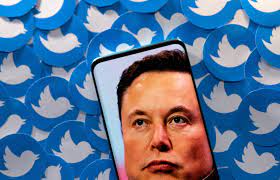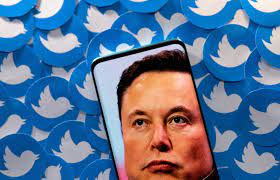
According to reports quoting sources with knowledge of the matter, the banks supplying $13 billion in funding for Tesla CEO Elon Musk's purchase of Twitter Inc have decided to abandon plans to sell the debt to investors due to uncertainty surrounding the social media company's fortunes and losses.
The banks do not intend to syndicate the debt, as is common with such acquisitions, and instead intend to keep it on their balance sheets until there is more investor appetite, according to the sources.
Morgan Stanley, Bank of America, and Barclays Plc have all declined to comment. No comments were available from Musk and Twitter representatives.
Musk agreed to buy Twitter for $44 billion in April, before the Federal Reserve began raising interest rates to combat inflation. In the eyes of credit investors, this made the acquisition financing appear too cheap, so the banks would have to take a financial hit totaling hundreds of millions of dollars to get it off their books.
Uncertainty about the deal's completion also prevented the banks from marketing the debt. Musk has attempted to back out of the deal, claiming Twitter misled him about the number of spam accounts on the platform, and only agreed to meet a Delaware court judge's Oct. 28 deadline to complete the transaction earlier this month.
The debt package for the Twitter deal includes junk-rated loans, which are risky due to the amount of debt the company is assuming, as well as secured and unsecured bonds.
Rising interest rates and general market volatility have prompted investors to avoid some junk-rated debt. For example, Wall Street banks led by Bank of America lost $700 million in September on the sale of approximately $4.55 billion in debt backed by Citrix Systems Inc.'s leveraged buyout.
After failing to locate buyers, a group of banks decided to cancel attempts to sell approximately $4 billion in debt that funded Apollo Global Management Inc's purchase of telecom and broadband assets from Lumen Technologies in September.
(Source:www.economictimes.com)
The banks do not intend to syndicate the debt, as is common with such acquisitions, and instead intend to keep it on their balance sheets until there is more investor appetite, according to the sources.
Morgan Stanley, Bank of America, and Barclays Plc have all declined to comment. No comments were available from Musk and Twitter representatives.
Musk agreed to buy Twitter for $44 billion in April, before the Federal Reserve began raising interest rates to combat inflation. In the eyes of credit investors, this made the acquisition financing appear too cheap, so the banks would have to take a financial hit totaling hundreds of millions of dollars to get it off their books.
Uncertainty about the deal's completion also prevented the banks from marketing the debt. Musk has attempted to back out of the deal, claiming Twitter misled him about the number of spam accounts on the platform, and only agreed to meet a Delaware court judge's Oct. 28 deadline to complete the transaction earlier this month.
The debt package for the Twitter deal includes junk-rated loans, which are risky due to the amount of debt the company is assuming, as well as secured and unsecured bonds.
Rising interest rates and general market volatility have prompted investors to avoid some junk-rated debt. For example, Wall Street banks led by Bank of America lost $700 million in September on the sale of approximately $4.55 billion in debt backed by Citrix Systems Inc.'s leveraged buyout.
After failing to locate buyers, a group of banks decided to cancel attempts to sell approximately $4 billion in debt that funded Apollo Global Management Inc's purchase of telecom and broadband assets from Lumen Technologies in September.
(Source:www.economictimes.com)














